Navigating the world of vehicle transportation can sometimes feel like a maze, especially when you’re staring down a plethora of quotes, each varying wildly from the other. What exactly influences these transportation costs? How does a sleek sedan’s auto shipping rate differ from that bulky construction machinery you need for your next project?
At MoveWheels, we understand the pulse of the industry and recognize that every vehicle, from the nimblest coupe to the heaviest excavator, has its own unique shipping needs and associated costs. This article aims to pull back the curtain, giving you a transparent view into the myriad factors that determine vehicle shipping prices.
Differentiating Between Vehicle Types
Every vehicle, from family cars to construction giants, has unique shipping needs. Here’s a concise breakdown to help you understand how different vehicle types can affect transportation costs.
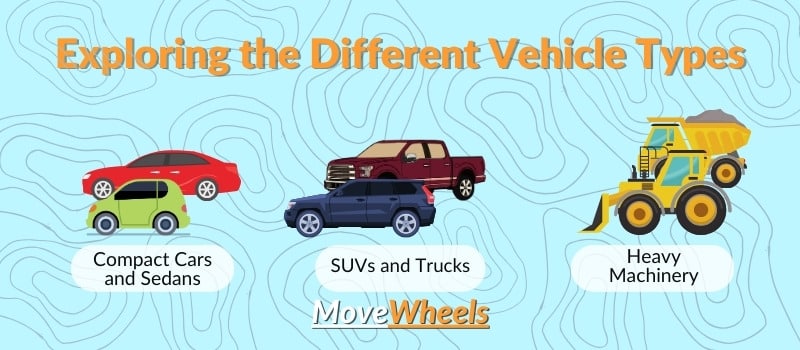
Compact Cars and Sedans
SUVs and Trucks
Heavy Machinery
Understanding the differences between vehicle types is crucial when estimating transportation costs. It’s not just about distance; it’s about dimensions, weight, and the unique requirements of the vehicle in question. As you navigate the complexities of vehicle shipping, remember to equip yourself with the right knowledge to ensure you’re not caught off guard by unexpected costs.
Methods of Transportation
When it comes to moving vehicles, the method you choose directly affects the transportation costs. Let’s explore the most common options:
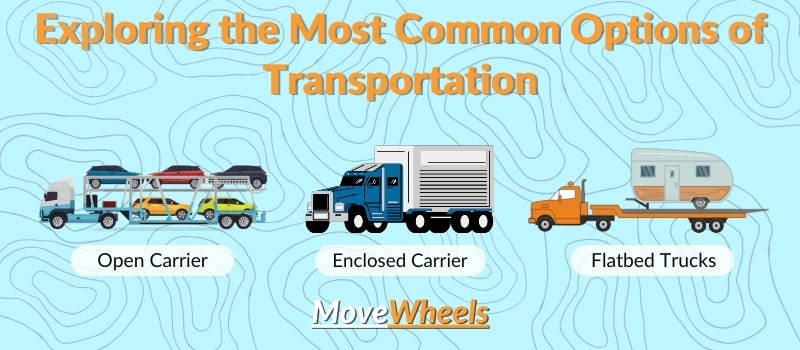
Open Carrier:
This method uses multi-car trailers without walls or a roof. It’s the most common and economical form of auto transport, widely available for most standard vehicles. While cost-effective, with the national average for a coast-to-coast move around $900 according to our 13 years industry experience. But we need to mention that it offers less protection from weather and road debris.
Enclosed Carrier:
Imagine a mobile garage; a covered trailer providing protection against external elements. It’s pricier but perfect for luxury, vintage, or special vehicles. Based on the loadbords prices using an enclosed carrier can bump the car moving cost by 30% to 60% compared to open carriers.
Flatbed Trucks:
These are open platforms primarily used for oversized vehicles and heavy equipment. Their versatility comes with higher equipment hauling rates due to specialized handling. As indicated by FreightCenter, transporting large machinery with a flatbed might start from $1,000, fluctuating based on specifics.
Your choice will inevitably play a significant role in the overall cost and safety of your vehicle’s journey. With the right information, you can find a method that meets your needs and budget.
Main Factors Influencing Transportation Costs
When it comes to getting your vehicle from Point A to Point B, you might wonder, “What’s driving these vehicle shipping prices?” Several factors can influence the overall transportation costs, and understanding them can help you anticipate and even mitigate some of these expenses. Here are the primary determinants:
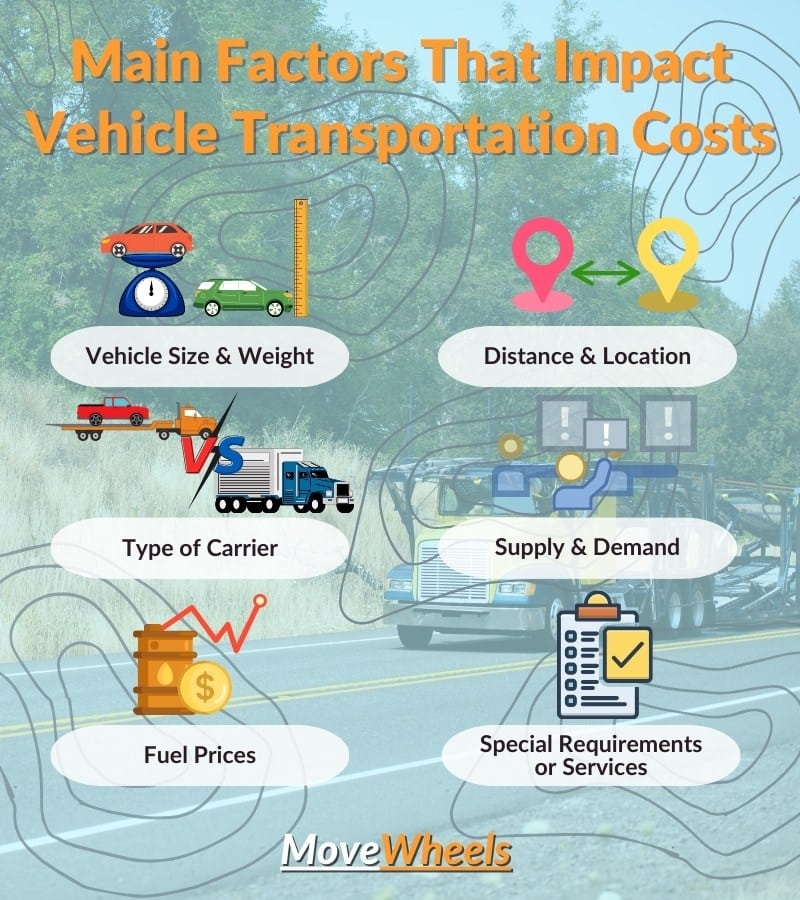
Understanding these pivotal factors can give you an edge when planning your vehicle’s transportation. Whether you’re shipping a compact car or hefty machinery, being informed ensures you get the best value without surprise costs.
Other Factors to Consider
While the nuts and bolts of transportation costs are important, several nuanced factors can also shape your vehicle shipping experience. Beyond just the car moving cost, here are other considerations that might play a role in your decision-making:
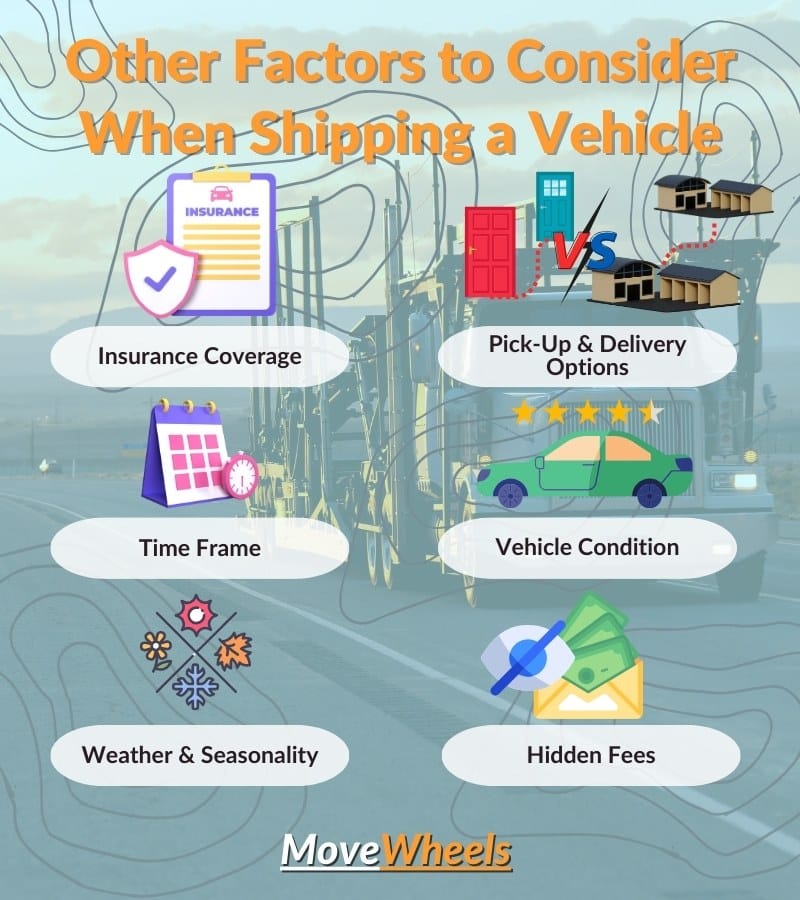
By delving into these additional considerations, you’ll be better equipped to navigate the intricacies of transporting your vehicle. It’s not just about the upfront vehicle shipping prices; it’s about the entire experience, ensuring it’s smooth, secure, and aligned with your needs.
How to Obtain a Cost-Competitive Quote
Securing a cost-competitive quote for your vehicle’s transportation shouldn’t feel like cracking a secret code. It’s about research, knowing the right questions to ask, and making informed decisions. If you’re looking to get the best bang for your buck without compromising on service, here’s your roadmap:
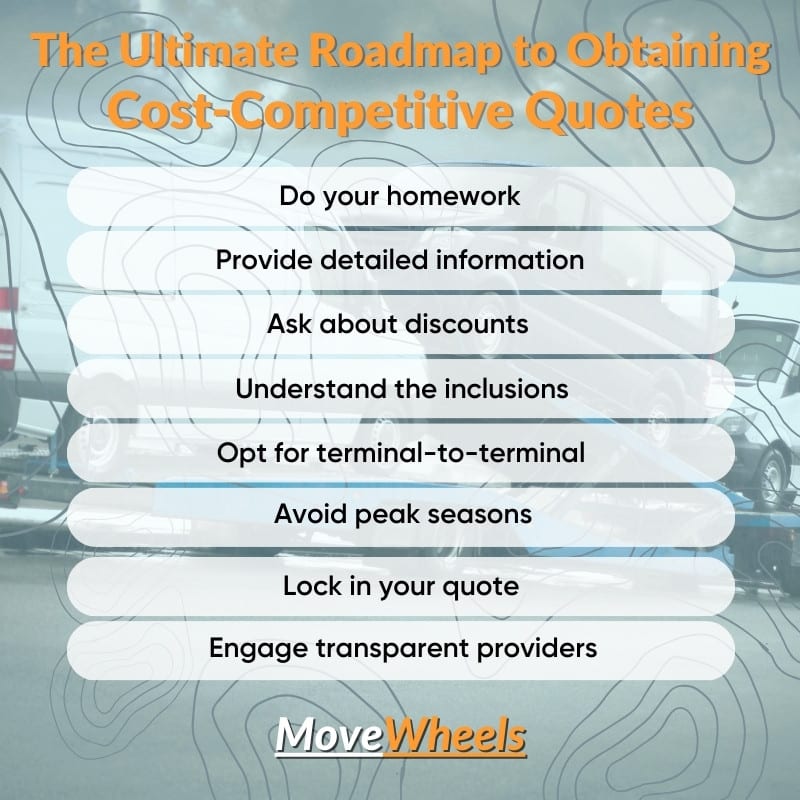
Gathering a cost-competitive quote isn’t just about pinching pennies. It’s about ensuring you receive exceptional value for every dollar spent. By following these steps, you’ll be well on your way to transporting your vehicle at a cost that sits comfortably within your budget.
Navigating the world of vehicle transportation can initially seem daunting, with various factors influencing costs and an array of choices to make. However, armed with the right knowledge, you can make decisions that are both cost-effective and aligned with your needs. Whether it’s understanding the influence of vehicle types, weighing transportation methods, or securing competitive quotes, each step plays a pivotal role in ensuring a smooth and satisfactory shipping experience.
With companies like MoveWheels at your service, rest assured that your vehicle’s journey, whether it’s a compact car or heavy machinery, is in expert hands. Remember, it’s not just about the cost—it’s about value, trust, and peace of mind.
FAQ
How can I ensure the transporter I choose is reputable and will handle my car properly?
Always check reviews and ratings on trusted platforms like FMCSA, Central Dispatch, and BBB. A carrier with positive reviews is likely to offer quality services that prioritize vehicle safety.
Can I ship personal items in my vehicle during transportation?
It varies by company, but many recommend not shipping personal items due to weight restrictions and potential liability concerns. Always check with your transporter.
Are there any preparations required for the vehicle before shipping?
Yes. Generally, you should clean the vehicle, remove personal items, disable alarms, and check fluid levels. Ensure the gas tank is about a quarter full and document any pre-existing damages.
What happens if my vehicle gets damaged during transport?
If damage occurs, document it upon delivery, get the driver’s signature acknowledging the damage, and contact the shipping company immediately. The company’s insurance should cover damages incurred during transit.
Is it cheaper to ship multiple vehicles at once?
Yes, many companies offer discounts for multi-vehicle shipments, which can reduce the per-vehicle transportation costs.
How are auto shipping rates calculated for electric vehicles?
Electric vehicles (EVs) are generally treated similarly to their gasoline counterparts. However, due to the often-added weight of batteries, they might have slightly higher shipping costs. Always provide specific vehicle details for an accurate quote.
Similiar Articles
- Is Your RV Ready for Spring Travel? Pre-Transport Checklist
- Open Vehicle Transport: How it Works and How Much It Costs in 2024
- Secure and Sophisticated: Your Complete Guide to Enclosed Auto Transport with MoveWheels
- New Year, New Motorcycle: Top Motorcycles` Choice among Americans in 2024
- How Vehicle Type Impacts Transportation Costs: From Cars to Heavy Equipment
- Why You Shouldn’t Put Personal Items in Your Car During Shipping
- Top 5 Advices for Shipping a Classic Car
- Choosing the Right Trailer for Heavy Equipment Transport
- The Mom’s Guide to Buying a Car
- Smooth Sailing: A Comprehensive Guide to Boat Transportation
